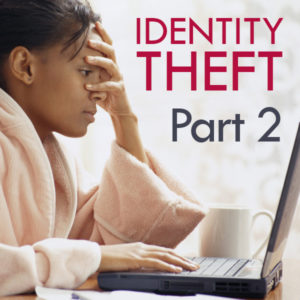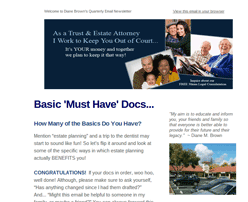How to Protect Yourself – Identity Theft – Part 2
Categories: Identity Theft, Senior Scams & Fraud, Trust and Estate Attorney
 In How to Protect Yourself – Identity Theft – Part 1, we defined hacking, skimming and phishing and learned how they are used to gather personal information. We also provided a list of personal information you need to protect and not give out just because someone asks. If they call or email you and ask you to confirm or provide anything on the list in Part 1 – assume it’s a scam!
In How to Protect Yourself – Identity Theft – Part 1, we defined hacking, skimming and phishing and learned how they are used to gather personal information. We also provided a list of personal information you need to protect and not give out just because someone asks. If they call or email you and ask you to confirm or provide anything on the list in Part 1 – assume it’s a scam!
Here in Part 2, we look at why identity theft happens, learn who is at risk and review ways you can make yourself less attractive to would-be identity thieves.
Why Does Identity Theft Occur?
And why would they target me? Well, there are any number of reasons. First, a little myth-busting. Regardless of your age, credit score, available credit, household income, real estate assets, investment portfolio, or if you are insured or uninsured, YOU are a target. Your identity has value in any condition! It is just a matter of matching your identity to the buyer who needs what you have.
Identity theft goes beyond financial opportunity.
A stolen identity can be used to:
- Perpetrate criminal activity against people and property
- Gain money, food or services from the government
- Receive tax refunds from the IRS
- Open other accounts in your name
- Provide identification at the scene of an accident
- Access an emergency room or other medical services
While some of these may not create immediate hardship to you, if arrest warrants, unpaid medical bills and balances on strange retail accounts start popping up, it quickly becomes a very different story!
Ways to Keep Your Personal Info Safe
COMPUTER, DEVICES & WIFI
- Be wary of shared computers – you are only as safe as the others who use it
- Learn to protect devices from hacking – computers, phones, and wireless internet connections
- Understand the difference between a public wireless internet connection that is open vs one that is secure and why it matters
EMAIL, ONLINE SHOPPING & SOCIAL MEDIA
- Create strong passwords
- Use a different password for each account
- Do not daisy-chain online accounts – Like using ONE social media account to login to other accounts
- Learn to use privacy settings on your social media accounts
- Refrain from sending Personal Identifying Information via email – See list here
- Shop only on secure retail websites
- Log out of any account as soon as you are done
- Use an alternate identity for casual web-surfing and little online accounts
FINANCIAL
- Watch your credit card statements and pay attention to charges that don’t make sense to you
- Check your credit report and watch for accounts you did not open
- Keep an eye out for small and/or recurrent charges – it may be an indication of fraud – report it
- Remember, a skimmed credit card may be used now or 3-6-9-12 months from now
- Know how/why/when to shred financial documents
PAPERWORK
- Remove your birth certificate or Social Security card from your wallet or purse
- Shred, shred, shred! Your mail, anything with your address, those bar-code stickers that come on your mail, old account information, things with your email address, old credit cards or auto club cards, airport generated luggage tags – shred it all!
- Keep your airport boarding pass out of view – there is plenty of info encoded in those!
ALWAYS…
Report identity theft attempts when they happen
Share What You Know – Save the Day!
While we’re bound to cover some of these topics in greater depth in future posts, we encourage you to find a buddy and make it a point to review and improve upon these things in your life.
If you have older relatives or friends to who may not know some of these things, you are always welcome to review this list with them. You may need to slow down, be extra patient and explain certain things that you might assume they already know. It’s always good to encourage folks to ask questions. The idea here is to create a space where older adults feel safe discussing these types of things.
Seniors are at special risk for fraud. If you missed our post: Cyber Safety for Seniors and Me Too, it goes into specific ways you can help seniors learn what they must know and STAY SAFE in the digital age. Have a look!
Have Questions About Estate Planning?
We handle wills, trusts, estate planning and financial or medical power of attorney. If you want to protect an aging relative from losing their hard-earned money to fraud or if you feel overwhelmed because a loved one has passed away without benefit of a will or trust, call to my Los Gatos office at 408-364-1234 to request an appointment.
You are welcome to Print this Free 30 Minute Legal Consultation Certificate.
Let’s get some of those questions answered!
 Diane M. Brown, Esq.
Diane M. Brown, Esq.
Working every day to keep my clients out of court!
It’s your money… Let’s keep it that way!
Call 408-364-1234
This blog contains general information and is not meant to apply to a specific situation. Please seek advice of counsel before proceeding as each case is unique.






No comments yet.